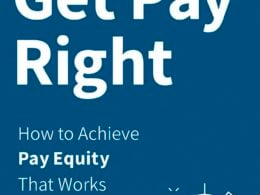While not all consultants are entrepreneurs, you can become an expert in your field by learning to hone your niche expertise the way, say, Neil Patel does, in order to create a powerhouse brand. A consultant, even a solo consultant, is running a business, and a business must be marketed.
This year, long-time consultant, Elaine Biech, published two books: “The New Business of Consulting” (Wiley, 2019) and a companion workbook, “The New Consultant’s Quick Start Guide” (Wiley, 2019).
We talked to Elaine for some advice on how to market a new consulting business.
The following conversation has been edited for clarity and brevity.
What are some of the entrepreneurial aspects of being a consultant?
(Entrepreneurial) consultants want to be their own boss, realize their potential, help others, work directly with clients, take bigger risks, have a flexible schedule or experience unlimited income.
They have a passion and a drive to do the best they can and believe they can do anything they set their minds to. They are take-charge kinds of people who can work long hours when it is required. They like to solve problems and can see both the big picture and the details when necessary.
Also, consultants must be entrepreneurs who run a business. Many consultants become consultants because they are good at what they do. However, they also must run their businesses: advertise, bill their clients, track their cash flow, pay taxes on time, network, give back to society, invest in their future, purchase technology, create marketing materials, attend to business laws and insurance needs, and so on and so on.
If consultants are not paying attention to their businesses, they will be out of business very quickly.
Related: Business Coach and Consultant Lolly Daskal Talks Breakthrough Leadership
What is a big mistake that many new consultants make, and how do those mistakes cause problems for them?
The biggest mistake new consultants make is underpricing their services. They feel that if they price low, they will acquire more contracts. (That) may be detrimental, because it could appear that they aren’t as good as the consultants who are charging two or three times their fee.
How does this happen? Let’s say a consultant is making $60 per hour as an employee. So, the consultant decides to give herself a raise to $90 per hour (when going out on their own). Sounds great, right? Wrong. The consultant will go out of business.
What’s a better plan?
I suggest my 3X rule as a starting point. Choose an annual goal of three times what they want to make. If during the first year they plan to work from home, they could squeeze by with 2.5 times as much. That means if they want to make $100,000, they need to bill about $250,000 to $300,000.
Then, divide it by the number of days they will be able to work. One hundred and twenty days per year is a good place to start. Remember, they need other days to do all the administrative work, market their services, and address all the details of a well-managed business. Besides, if a new consultant can deliver services 120 days during the first year, they are doing well. Don’t lowball the fee.
And here’s a third problem underpricing can cause: It is much more difficult to increase a consulting fee at a later date than to establish an appropriate fee during launch.
What are some cost-effective marketing techniques for new consultants?
The most important and effective marketing technique is to do good work. Referrals are the least costly because you don’t spend any marketing dollars; fastest to close because you have a built-in endorsement by some mutual entity; and quickest to get up to speed because your presence suggests a strong element of trust.
Recent research showed that 37 percent of consultants listed referrals as their primary means of generating new business. The next highest was networking and events at 18 percent.
I can trace all of my current clients back to my first client, S.C. Johnson in Racine, Wisconsin. You want to do such a great job that your clients market for you to other organizations and to other departments in the same organization.
Beyond referrals and networking, consider partnering with other consultants, blogging, speaking at conferences, writing articles or books, or anything else with a personal touch.
Also, pass out business cards freely. They are a great bargain, so be sure you have taken the time to word them perfectly and to get the unique look you desire. I like to give everyone two cards—one to keep and one to pass on.
Sign Up: Receive the StartupNation newsletter!
How important are websites and a social media presence?
You need a website. It is a basic starting point; a baseline for professionalism. It gives you web presence and establishes you as someone who is serious about their business. Your website does not need to be expensive, but it should be ordered and appealing. A website gives visitors an easy way to learn more about you, informs the public of what you offer, and can help you with content marketing and gathering leads.
You need to be on social media, too, even if just to follow leaders in your area and respond to their blogs. Keep your social media presence focused and simple. Know your clientele and where they hang out. Provide a way to drive traffic from your social media to your website. That’s where you will turn “likes” into leads.
Is there anything else readers should know about you, your work or about starting a consulting business?
This is my favorite question, and it should be a favorite of all consultants.
It often leads to some of the most valuable information you’ll learn about your client. I learned a valuable lesson the first time I asked that question, when the response was, “Be sure to interview the naysayers in our company.”
Ever since that time, I’ve interviewed employees who are both supportive of a project and those who are not.
“The New Business of Consulting” is available now and can be purchased via StartupNation.com.
Originally published July 30, 2019.






